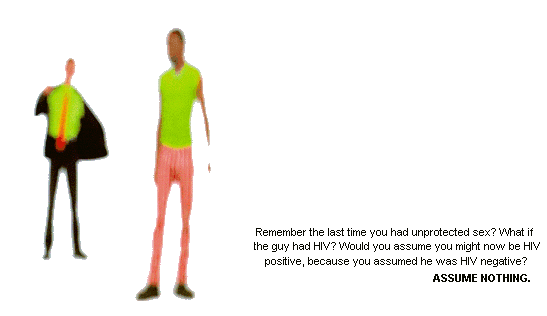
The Assume Nothing messages do not seek to deliver
any specific safer sex information, which is now well known to gay and bisexual men.
They are rather an attempt to address the root of the continuing epidemic - unprotected sex between an uninfected
man and a man with HIV. The campaign looks at particular instances of how this might happen. It seeks to lead gay
and bisexual men to identify with the behaviour and thoughts used in the text and photographs of each of the campaign
images. The campaign will make gay men consider their behaviour and the choices they make about sex and so reassess
the risks they may be taking.
The Assume Nothing Campaign is the first time that several gay men's HIV prevention agencies across England have
collaborated on a national mass media campaign. This is HIV prevention work appropriate to populations of gay men
both in and outside London. It will also reach as diverse groups of homosexually active men as possible. The campaign
was researched with several groups of gay men around the country and also with the general population. As the campaign
will be displayed in public spaces, it is important to get a sense of what affect they have on a wider audience
and their influence on general attitudes towards HIV, AIDS and gay men.
WHY A CAMPAIGN FOR GAY AND BISEXUAL
MEN?
It is clear that while gay men as a group have made unparalleled behaviour change in adopting condom use, some
men are understandably finding it difficult. This is particularly the case for some men in long term relationships.
Research shows that while gay men are still putting themselves at risk by having unprotected sex with partners
of unknown status, they are less likely to do so if they are aware that they have a different HIV status to their
partner.
Thus the campaign's aim is to raise awareness of the risks involved in making assumptions about your own or your
partner's HIV status in negotiating safer sex: the possibility of you having a different HIV status and the reality
of one infecting the other.
WHY DO GAY MEN STILL HAVE UNPROTECTED
SEX?
Unprotected sex often happens because some men sometimes play down the risks or rationalise and justify their decisions
by making assumptions. Underplaying or denying the possibility of infection may happen for many and complex reasons:
- Uninfected or HIV negative men may assume that all men with HIV will disclose their status to sexual partners or take the responsibility for using condoms;
- Men with HIV may sometimes assume their sexual partners to be HIV positive if they do not negotiate condom use;
- However, unprotected sex is more likely to occur, not because of any rationalised decision (however flawed), but as a result of completely irrational feelings and emotions around sex, bound up with love, trust, intimacy, passion, risk taking, pleasure and so forth.
INFECTION IN RELATIONSHIPS
The Campaign looks at issues many gay men find difficult to face - that HIV infection often occurs in relationships.
It can be particularly hard to believe that the person you love and plan to share a future with might actually
have HIV. Firstly, nobody wants to consider the reality that their lover may have a life threatening illness, and
secondly, that they could infect you. This often touches a nerve with people in relationships, but it is this very
denial that is shown to be a major cause of new infections. While casual sex is commonly held to be a higher risk,
this is not borne out by what we know about unsafe practise.
Often the more a person knows about someone, particularly their sexual history, the more inclined they are to base
their sexual decisions on assumptions, rather than any reliable information about HIV status.
Negative assumptions
One issue the campaign addresses is that people often assume that unprotected sex is just about putting themselves
at risk. They often fail to consider that they may actually be passing the virus on. Many people with HIV are all
too aware of the potential for infecting someone. However, untested and even people who have previously tested
HIV negative may actually be infected and be putting others at risk.
Not using condoms
The Assume Nothing Campaign - by challenging gay men and bisexual men about their behaviour and the assumptions
they make - endeavours to encourage a shared responsibility for safer sex. It recognises that 15 years into the
epidemic gay men have developed a wide range of strategies for staying uninfected or not passing HIV on. Some of
these strategies might not involve condom use.
The campaign works with this reality, but highlights the risks involved with some choices, particularly when they
are based on assumptions about whether your partner or yourself are infected or not.
IMAGE DEVELOPMENT
The campaign images were designed with a number of factors in mind. Firstly they had to compete with other advertising
images and with numerous representations of gay men in the gay press. They had to somehow complement the messages
and also speak directly to as diverse a range of gay men as possible.
The blurred images of two men purposely distinct and separate were also intended to be seen as interacting in a
sexual but subtle manner (gay men are more likely to read these as sexually charged or as interactions between
lovers). Displayed against a vast white space, they were designed to communicate a feeling of isolation, alienation
and a lack of clear communication, despite the sexual and emotional overtones. The design ideas were thus meant
to complement the messages - the risks involved in making assumptions, lack of clear communication and so on -
as opposed to safer sex strategies based on reliable information.